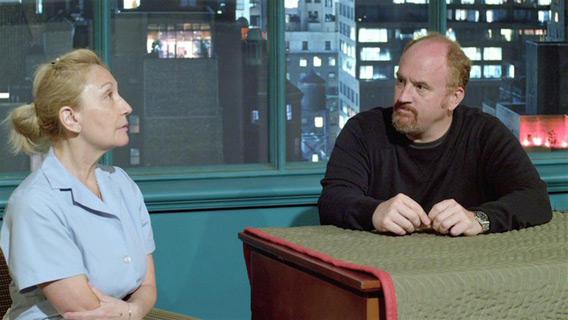The writers of Seinfeld famously subscribed to a four-word philosophy when it came to structuring storylines: “No hugging, no learning.” This scorched-earth attitude toward third-act sentimentality is one of many reasons Seinfeld was such a refreshing and revolutionary television comedy. By contrast, Louis C.K., who grew audibly, affectingly verklempt while discussing his love for his daughters on Marc Maron’s podcast a few years back, clearly believes there’s a place for sentimentality on his own revolutionary show, and despite a cameo from Jerry himself, there was hugging and learning galore in tonight’s show.
This was a tremendous episode, but there were times when it threatened to buckle under the weight of tender moments that C.K. handled, I felt, with insufficient tenderness: his soft spot for his daughters risks functioning, on occasion, as a blind spot. Perhaps it’s because I’m a childless child of Seinfeld, my frosty heart beating to a more Larry Davidian drummer, but I groaned when C.K. dropped those melancholy, now-ubiquitous piano notes after Jane’s “When will you see us?” and when he dropped them again after Lilly told Louie, later on, “We know you can do it.” One, two, three: Be moved. I wouldn’t have rubbed that emotional highlighter across Hadley Delany’s already well-read line, and I would have cut Lilly’s words of encouragement outright, because the girls’ “Dad Night Live” drawing had already done the job with greater power and simplicity. C.K. has proven himself a master of tone-juggling on this series, but tonight, treading the line between sweet and cloying—a game, admittedly, of centimeters—there were distracting, intrusive moments when he overstepped.
Not always, though. When Louie, about to storm out of Jack Dall’s office in frustration, stopped himself, let his armor fall, confessed his hopes and fears, and launched into his belly-rubbing penis parade dance, I cheered the ludicrous gameness of the gesture and the complexity of the writing behind it.* Last week, Louie was up against some highly unhelpful helpers in Jack and Alphonse, but tonight the biggest obstacle to a breakthrough was clearly Louie himself, as he tried to suss out where artistic integrity stops and stubborn pridefulness begins. We saw this at play when he told Jack, “I’m not that kind of funny,” after Jack commanded, “Make me laugh—go.” Comedians rightly hate it when people, in civilian life, away from the stage, treat them like trained monkeys, and so part of what we were seeing was justifiable resentment on Louie’s part. Except this isn’t civilian life, it’s the Late Show. Being funny on a dime, as Jack knows, is part of the job description. Unless you’re Tom Snyder.
What fine work from Lynch this week. He preserved the off-kilter rhythms of last week (“Interviews!”) and got off some excellent laugh lines (“That’s short for champion”), but also added a strain of eccentric-paternalistic tough-love and, in his final moments on screen, a winning hint of pathos, as he explained that if Louie got the gig, CBS would bring in “a younger producer.” With that line, we see that Jack isn’t a player or gatekeeper so much as an antique, all but left on the curb for collection. Contrast him to this arc’s other grandfatherly grayhair with a beautiful big desk, Garry Marshall’s CBS chairman: As old white men, both characters are emblems of entrenched power, but Jack, for all his contentiousness, goes out and gets beautiful suits tailored for his charges and calls them “Buster,” while the chairman turns out to be a callous puppeteer, his rousing speech to Louie, in point of fact, a cruel con.
We can widen this “penis parade” of powerful papas to include two others—the unseen Louie Sr. from “Dad,” and the unseen David Letterman, installed high above the Ed Sullivan theater. Louie ran from his dad’s doorstep. Here he stands on Letterman’s and screams, euphorically, “Fuck you!”
I’ll leave it to you both to get into Louie’s (qualified) triumph. Not only did his test show seem pretty good, but it also seemed—improbably—plausible. Louie wore that suit damn well, and his comedic sensibility, adapted to a network talk show, would look a lot like meta-jokes about teleprompters and Susan Sarandon jerk-off confessions, wouldn’t it?
I’m not a newsman,
Jonah
Correction, Sept. 21, 2012: This entry misspelled the last name of David Lynch’s character. (Return.)
